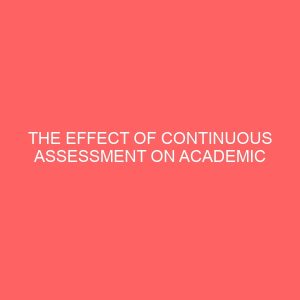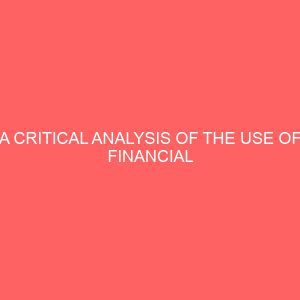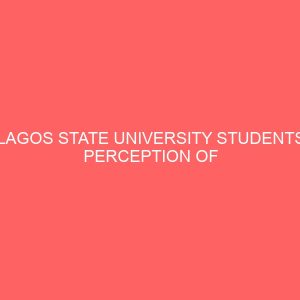Description
Chapter one
Introduction
- Background to the Study
This project is on Advertising on profitability of business organization. From a marketing perspective, sales and profits belongs to the tangible asset in firms valuation and the impact of marketing strategies (e.g. Advertising) on sales and profit has been well documented for both the short run (e.g., Lodish, Leonard M., Magid, Livelsberger, Lubetkin, Richardson, and Stevens, 1995) and the long run (e.g., Nijs, Vincent, Marnik, Jan-Benedict, and Hanssens 2001; Simester, Hu, Brynjolfsson, and Anderson. 2009.), for multinational corporation (e.g., Joshi & Hanssens, 2010) and local industry in company in Nigeria (e.g., Adekoya, 2011).
Advertisement in such a media as print (newspaper, magazines, billboards, flyers) or broadcast (radio, television) typically consist of pictures, headlines, information about the product and occasionally a response coupon. Broadcast advertisement on the other hand consists of an audio or video narrative that can range from 15seconds spots to longer segments known as infomercials, which generally last 30 to 60 minutes (Busari, Olannye and Taiwo, 2002). Advertisements can also be seen on the seats of grocery carts, on the wall of airport walkways, on the sides of buses, airplane and train. Advertisements are usually placed anywhere an audience can easily and/or frequently access visual and/or video (Busari et al, 2002). Advertising create awareness about a product and service to the prospective customer and hence stimulate interest and buying decision which increase sales revenue and profit. Advertisement may be paid and non paid promotional tools in form of print, audio and video advertisement. Olusegun (2006) opined that all advertisement must be honest and follow ethical standards and must not be perceived by the target consumer as lie; otherwise it can batter the image of a company and hinder it from building successful brands.
Profitability on the other hand is composed of two words, namely, profit and ability. The term profit is explained as revenue minus cost (direct and indirect cost) and the term ability indicates the power of a business entity to earn profits (Tulsian, 2012). The ability of a concern also denotes its earning power or operating performance. The profitability may be defined as the ability of a given investment to earn a return from its use. Profitability is a relative concept whereas profit is an absolute connotation. Despite being closely related to and mutually interdependent, profit and profitability are two different concepts. In other words, in spite of their generic nature, each one of them has a distinct role in business. Greuning H.V (2005: 27), making some interpretation about International Financial reporting Standards (IFRS), considers that the profitability indicators generally mean “an indication of how a company’s profit margins are associated with sales, average capital and own average capital.
In explaining the relationship between the advertising expenditure and the profitability of business, Akanbi and Adeyeye (2011) examined the relationship between advertising and sales volume of Nigerian Bottling Company Plc between 1999 and 2009 and conclude that there is a significant relationship between advertising and sales volume of the company. In supporting the view of Akanbi and Adeyeye (2011), Olufayo, Ladipo and Bakare (2012) evaluate the relationship between advertising and patronage of a new product using Nestle Plc as a case study. Olufayo, Ladipo and Bakare (2012) posit that there is relationship between advertising and consumer patronage as well as between budget allocation to advertising and sales volume of the firm. Dauda (2015) in his study observe a reservation with respect to relationship and significant of advertisement in explaining increase in sales revenue and profitability as observed by Olufayo, Ladipo and Bakare (2012) Akanbi and Adeyeye (2011) by examining the effect of advertising on the sales revenue and profitability of selected food and beverages firms in Nigeria, He therefore assert that advertising is one of the most important medium of communication influencing the companies performance in more than one ways but that its influential strategic importance could be suppressed by other factors such as sales promotion, personal selling, and publicity, public relation which also try to receive equal attention at time of deciding any sales and profitability strategy.
1.2 Statement of the Problem
The business world is highly competitive with every companies jostling for a share of the market and striving to increase their sales revenue and profitability. Advertising techniques employed by one firm are easily becoming outdated with new strategies and the surging growth in E-marketing tools through the worldwide web introduced by another firm. This high competition has rendered most advertising effort ineffective and the sales revenue vis-à-vis the profitability of companies in Nigeria had dwindled instead of increasing. The goal of this study is hence to study the effectiveness of advertisement in improving profitability of business organization in a highly competitive financial industry in Nigeria.
Extensive study on the impact of effective advertisement on sales revenue and profitability has been carried out over the years and various recommendation made on how to increase profit through effective advertisement. Previous studies have used various data analysis techniques to establish relationship between advertising cost and organization sales and profitability. For example Dauda (2015) uses a stationary test, ordinary least square and correlation techniques to analysis a time series data based on the flaw identify in Akanbi and Adeyeye (2011) he however create a room for further complexity and study in examining the proportion of impact that advertisement have on profitability in relation to other promotional tools.
This study will therefore attempt to understand whether the advertisement have any influence on the profitability of business organization in Nigeria and whether such influence is significance enough to justify the importance of advertisement in an organization.
1.3 Research Question
Based on the statement of the problem the following research questions needed answers;
- Does advertisement cost have any significance impact on the profitability of the banking sector in Nigeria?
- What are the benefit of advertisement to the organization
- Is there any disadvantages in advertisement expenditure to the banking sector in Nigeria
- Is expenditure on advertising a necessity in promoting and improving bank profitability?
- How can we measure the effectiveness of advertising expenditure in increasing the profit of the Nigerian banking sector?
- What factors determine the choice of advertising media of a business organization
1.4 Objectives of the Study
The main objective of the study is to find out the impact of advertising on profitability of business organization.
Other objectives of the study are to;
- Determine the extent to which advertising costs impact profitability of business organization.
- Evaluate the impact of the advertising costs on the profit of UBA.
- Identify the major merits and demerits of advertising.
- Get to know the concepts of advertising, forms of advertising, functions and criticism
- Explained the basic tools for measuring advertisement effectiveness.
- Identified the possible factors which can shape and determine the choice of advert media used by business organization in Nigeria.
1.5 Statement of Hypotheses
The hypotheses to be tested by the study; stated in the null form, are as follows:
Hypothesis one
Ho: Advertising does not have any significant impact on the profitability of business organization.
Hi: Advertising has a significant impact on the profitability of business organization
1.6 Significance of the Study
The study is expects to yield a number of desirable benefits, the most important of which is contribution to existing knowledge. Specifically, the findings of the study would provide direction as to the impact of advertising costs or expenditures on the sales revenue and profitability vis-à-vis sales profitability of commercial banks in Nigeria sector. The study will help also help to verified and contribute to the body of knowledge by explaining the proportion of profitability increase explain by advertisement only as a promotional tool in the banking sector of Nigeria..
Similarly, the study also hopes to expand the frontiers of knowledge in the area of conducting its analysis through the use of techniques that have been hitherto overlooked not well interpreted by the previous researcher by previous researchers on the effect of advertising on the profitability of business organization with special consideration of the banking industry.
Apparently, the advertising budget of the Nigerian commercial banks had grown over the years to constitute a reasonable chunk of expenditure for the financial sector in Nigeria; little research attention has been paid to the effect of such advertising costs on the sales revenue and net profit of the banks in Nigeria.
The importance of the findings of the study to the managers of financial sectors in Nigeria, especially those in the commercial bank in could not be quantified in that it would provide evidence with respect to the justification of managers‟ increased resource commitment to advertising in Nigeria over the years. The findings would equip managers with better insights on how to juxtapose the benefits of increase in advertising expenditure vis-à-vis sales revenue and net profit.
Furthermore, the study was also expected to be of immense utility to shareholders whose primary goal is to maximize their wealth. The findings of the study would help shareholders in their bid to monitor managers and ensure that only costs that could ensure the maximization of shareholders‟ wealth were incurred by managers on behalf of shareholders.
1.7 Scope of the Study
This study is concerned with assessing the impact of advertising on profitability of business organization using a selected commercial bank in Nigeria. The study restricted itself to the banking sector in Nigeria using the United Bank of Africa as a case study, based on the important role the bank play in the economic growth and job creation in the country.
The study is also limited to the impact of advertising expenditure only and other factor which impact on the profitability of business organization in the banking sector are not consider. A period of 11 years was adopted for the study ranging from 2004-2014. The choice of the period has implications for the study because it is the period within which commercial bank in Nigeria were restructured and reorganized due to a number of merger and acquisition by Nigerian banks during this period and also considering the fact that the advertising expenditure increased arithmetically during this period.
1.8 Limitation of the Study
One of the major limitations for this study is the transportation cost incurred by the researcher. The data for this study which were extracted from the annual reports and accounts of the companies under study were got at the Abuja stock Exchange libraries. This entailed huge sum of money to execute and had affect the scope of the study.
Financial statement of the bank from the 1999-2003 could not be located in the library and this affect the ability of the researcher to take a long term analysis of the significant impact of advertising on the profitability on business organization. This explains the reason why the scope of the study is limited to 11 years i.e. 2004-2014 based on the available data from the financial statement.
Further, many number of commercial bank under the financial sector would have been studied, but unavailability paucity and reliability of necessary data due to the changed in accounting standard from the international accounting standard (IAS) to the international Financial reporting standard (IFRS) had been stumbling block which limit the scope of this study. The researcher had no any other available option to him than to restrict the scope of this study to the United Bank of Africa Financial Statement that that are available.
1.9 Definition of Terms
The following terms were in view of their operational meanings:
Advertising: It is any paid message presented through various media, such as television, radio, magazine, newspapers or billboards by an identified source. Advertising is a means of creating awareness about a company product and services as well as stimulating buying and re-buying decision.
Marketing Strategy: It means marketing actions by management to off-set actual or potential actions of competitors. Marketing strategies consist of various marketing tools used by business organization to sell its products and services. Marketing strategies includes the marketing mix of price, Promotion, place and product; green marketing, telemarketing, online marketing and other tools of making product and services attractive as well stimulate purchase.
Profitability: It is defined as either accounting profits or economic profits. Accounting profits mean net income, while economic profits mean net worth. Profitability is the difference between the turnover or sales and the operating cost of business organization.
Financial sector: The financial sector consist of the commercial banks, the mortgage bank, the microfinance bank, finance institution such as AFDB, merchant bank, Nexim bank etc.
Business organization: A business organization represent a any institution set up to put resources together toward providing utilities with the sole aim of making profit.








Reviews
There are no reviews yet.